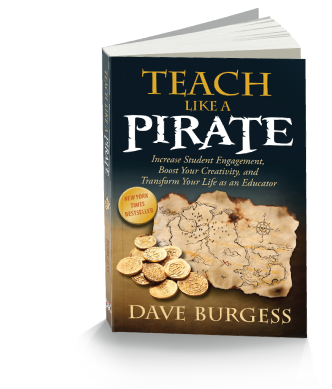I recently took my family to Australia for a combination of Teach Like a Pirate programs and a much needed family vacation. It was awesome! My son scuba dived at the Great Barrier Reef and in the Whitsunday Islands while us more risk-averse family members were perfectly happy to stay at the surface and snorkel. Seeing a 7-foot Moray Eel swim below my daughter and me was plenty of adventure for this pirate!
So what does this trip have to do with our latest book release?
We all had to face an enormously difficult and daunting challenge; 13 days at the mercy of sporadic and limited access to wifi. Talk about the very definition of #firstworldproblems It is truly a wonder that family carnage didn’t ensue.
“Is somebody streaming videos? Our hotel wifi has been used up.”
“Don’t even think of logging on with my access code!”
“Should we eat dinner here?” “Well…does it have wifi?”
I clearly remember that the excitement of reaching the Lone Pine Koala Sanctuary and the anticipation of holding a koala for the first time was only exceeded by the sheer joy of seeing the FREE WIFI sign posted at the entrance. I saw kid after kid dive into their pockets and whip out phones in order to drink in the digital goodness of social media access like a dying-of-thirst survivor dropping to their knees at the edge of fresh water in the desert.
One night we walked downstairs to the lobby of the hotel in Sydney to go meet the #aussied crew for dinner and I watched my son stop abruptly at the exit heading out onto the street as if he were a home-release prisoner wearing an ankle bracelet. It dawned on him that the price of this excursion would be steep; 2 hours of lost wifi access. He turned around and went back to the room…and was followed by his 11 year-old sister clutching her iPhone.
The simple truth is that kids today (and us adults, too!) are constantly “pluggd-in.” A constant stream of media messages bombards us and we have a moral imperative to teach our students to be more critical consumers in the face of this never-ending onslaught. It’s not that media are evil, however, as Julie Smith says in her new book, “They are pervasive and persuasive.”
 That is why we are honored to publish an eminently readable and enjoyable media literacy manifesto from pirate professor, Julie Smith. In Master the Media: How Teaching Media Literacy Can Save Our Plugged-in World, Julie delivers a powerful message about not only the importance of teaching our children media literacy, but also includes everything you need to know to get started.
That is why we are honored to publish an eminently readable and enjoyable media literacy manifesto from pirate professor, Julie Smith. In Master the Media: How Teaching Media Literacy Can Save Our Plugged-in World, Julie delivers a powerful message about not only the importance of teaching our children media literacy, but also includes everything you need to know to get started.
Who is the target audience?
Are you an educator?
Are you a parent?
Are you a consumer of media yourself?
Basically, I’m saying this book is for you unless you live alone on a deserted island with no electricity…and if that is the case, how the heck are you reading this!
Julie is a friend. I have sat across from Julie at multiple dinners and heard her deliver passionate, raving rants about the importance of media literacy (punctuated intermittently with her distinctive cackle). At one of these dinners I threw down the gauntlet, “You need to write a book about this stuff!” We are pumped that she took me up on it and Master The Media is the result. Like Julie, it is interesting, poignant, and hilarious all at the same time. You’ll love it!
So…can media literacy really save the world? After all, that is a pretty bold sub-title!
Maybe not.
But with a perpetually plugged-in population, it is a pretty decent place to start.
Dave




